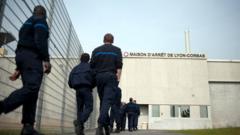On December 29, 2024, a Boeing 737-800 operated by Jeju Air crashed near Muan International Airport in South Korea, sparking safety concerns and an investigation into the potential causes. The Boeing 737-800, which makes up about 15 percent of the global aircraft fleet, has been in service for over two decades. With approximately 4,400 of these planes utilized by nearly 200 airlines worldwide, including five in South Korea, the model is a popular choice among carriers in Asia, Europe, and North America.
Boeing 737-800 Crash Investigation Unfolds in South Korea

Boeing 737-800 Crash Investigation Unfolds in South Korea
The global aviation community holds its breath as investigations begin into a tragic crash involving a widely used aircraft model.
Despite the alarming incident, aviation expert Najmedin Meshkati from the University of Southern California noted that the 737-800 has a solid safety reputation. The aircraft fleet varies in age, with the one involved in the crash being 15 years old, a relatively typical lifespan for a well-maintained aircraft. Jeju Air leased the plane from Ryanair in 2017, and officials are now thoroughly investigating the crash, including the potential for a bird strike causing a landing gear malfunction.
Bird strikes are not an uncommon phenomenon in aviation, occasionally resulting in cracked windshields or other challenges. Airports like Muan International have implemented various strategies to mitigate the impact of birds, such as playing distress calls or even using trained falcons.
Meshkati emphasized the importance of aircraft maintenance, as it can significantly influence the reliability of components like landing gear. However, he and other experts cautioned against hasty conclusions regarding the cause of the crash, highlighting that investigations into such incidents often take years due to multiple contributing factors.
As this situation develops, Boeing has communicated with Jeju Air and expressed its willingness to support the airline through the investigation process. The aviation world will be closely monitoring inquiries into this tragic event to ensure lessons are learned and safety measures are reinforced.
Bird strikes are not an uncommon phenomenon in aviation, occasionally resulting in cracked windshields or other challenges. Airports like Muan International have implemented various strategies to mitigate the impact of birds, such as playing distress calls or even using trained falcons.
Meshkati emphasized the importance of aircraft maintenance, as it can significantly influence the reliability of components like landing gear. However, he and other experts cautioned against hasty conclusions regarding the cause of the crash, highlighting that investigations into such incidents often take years due to multiple contributing factors.
As this situation develops, Boeing has communicated with Jeju Air and expressed its willingness to support the airline through the investigation process. The aviation world will be closely monitoring inquiries into this tragic event to ensure lessons are learned and safety measures are reinforced.






















